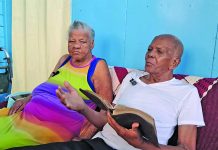As a first-time mom, I eagerly looked forward to holding my baby girl in my arms for the first time. I already envisioned the type of child I wanted to raise and the many adventures we would experience together as mother and daughter.
Prior to her second birthday, I noticed she had very poor eye contact, she was unwilling to engage in play with me and toddlers her age, she seemed a bit stubborn, she had less than five words in her vocabulary and was not very responsive to anyone. She didn’t respond to her name; she didn’t acknowledge my presence when I returned home after a long day. I was worried about her. Why wasn’t she developing as other toddlers her age?
When she was two years old, I took her to see a psychologist who confirmed that she has mild to moderate autism. This was very painful to hear since I had done my research and knew, to some extent, the challenges that lie ahead.
After crying for a while, I decided it was time to take action and I learnt all I could about autism and what interventions I could implement to help my beautiful baby girl. After play school, she was enrolled in a mainstream nursery school and there were several challenges in the classroom at this point. The teacher complained of her walking out of the class during sessions, having meltdowns and a lack of social interaction, among other things.
My saving grace was that her teachers were open to understanding her condition and trying different methods to reach and teach her and get her to participate. After nursery classes, she attended the Step-by-Step School in the afternoons for interventions, and I also worked with her consistently when we were home. She slowly began to make progress and this was very encouraging to me.
Today, she is well adjusted to primary school and gets good grades. She has overcome several challenges, but yet there are others we are currently working on. She longs to feel accepted by her peers and to build friendships, but she does not understand how this is done. She often feels ostracised, since she is not accepted in peer groups. Nevertheless, she has managed to maintain her grades over the years and she is working on developing other skills.
I cannot stress how important it is for parents, teachers, guardians, and professionals in the field to work together at the earliest possible time to realise optimum results.
I am forever grateful to the principal and teachers from her school who have gone the extra mile to ensure she is treated fairly and give her additional guidance and instructions as are needed.
Now, I look forward to a bright future once again with this beautiful, intelligent, talented, and energetic young lady. It’s “au-some”.
That was Rosanne Farley chronicling her experience as a mother of a child living with autism.
Rosanne’s daughter was diagnosed with mild to moderate autism in 2010 and ever since she has been working to make life easier for her. In order to better understand what her daughter is experiencing, Rosanne began working with the Step-by-Step School, where she was trained in working with children using the Applied Behavioural Approach, which is the therapy used for children with an Autistic Spectrum Disorder ( ASD).
Her daughter has been consistently improving and seeing that improvement has led Rosanne to become more invested in helping other parents who are going through the same experience. It has been about five years now since she has been an Autism Consultant and she has helped numerous parents accept their child has an ASD.
“I started screening children myself and once they scored high on the test, they would be referred to a visiting psychologist from the US. My daughter began to improve and because I was aware that there was a need and I wanted parents to understand that all is not lost when you get a diagnosis of autism, I decided to spread the word and provide guidance for parents who need that sort of help,” she said.
Rosanne reached out to paediatricians within Georgetown and informed them of what she was doing with the hopes of them spreading the word. To date, some of those doctors would refer patients to her so that they can be screened and get the help afforded to them.
“Many parents are suffering in silence, because they do not know what is going on with the child. Autism, unlike some other disorders you cannot tell from looking at them. They look perfectly normal. It is because it is where they are on the spectrum and what behaviours they exhibit. There are some things they may get and some you expect them to get and some basic concepts the child may not understand, and that is quite frustrating to the parents and they can’t understand why my child is acting this way, why my child is speaking at a level lower. So we help them to understand that,” she said.
For Rosanne, her biggest concern is children who are non-verbal owing to their ASD, because they are at a higher risk of being abused or molested.
“I am hoping to bring greater awareness of autism in Guyana so that parents will not be afraid to have their children tested, because there is great denial out there and I want to be able to reach out to children and provide the therapy they need and ensure that they get it. We have schools in Georgetown for children who are moderate to severely autistic, but we have no schools for children who are mild to moderately autistic, so my focus is to reach to those who are on the mild to moderate end of the spectrum and provide the therapy they need.
“Early screening, early diagnosis, early intervention are what we need. When this is done early, it increases the possibility of that child overcoming some of their challenges or getting better, and when parents wait until the child is eight or nine, it is more difficult and that is what is key right now. Parents need to understand that there is no reason to be afraid to get an autism diagnosis and it is not synonymous with retardation,” Rosanne declared.
To reinforce that, she uses the example of her daughter being exceptional in what is considered to be the regular school system. (Lakhram Bhagirat)











